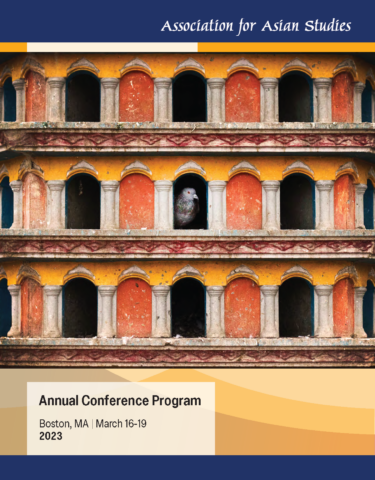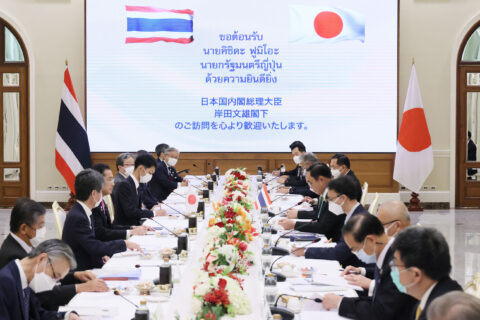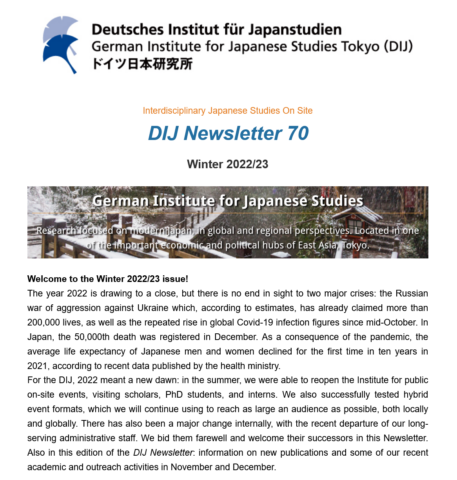Events and Activities
DIJ hosts panel discussion ‘Human-Machine Interaction and Responsibility’

Rapid advancements in new technologies, such as robots and AI, have brought about new social practices and realities. They come with manifold expectations and concerns, which mirror our understanding of what it means to be human. Drawing on perspectives from technological development, psychology, philosophy, social sciences, literature and art studies, the panel discussion ‘Human-Machine Interaction and Responsibility’ will tackle psycho-social aspects of human-machine interaction and their consequences, as well as ethical, legal, and socio-political implications. One important issue will be people’s rights and responsibilities when collaborating with machines and AI: Who will be credited for achievements, and who will be held responsible for tragic accidents? How does responsibility depend on the context and type of interaction between humans and machines? How should robots or AI be designed to be beneficial for society? The event takes place on March 27, on-site only at the DIJ, and will be moderated by DIJ’s Celia Spoden. Details and registration information here
Conference presents results from DIJ’s research cluster on ‘Local Communities’

Six former and current DIJ researchers who have contributed to the DIJ’s research cluster The Future of Local Communities in Japan – Risks and Opportunities in the Face of Multiple Challenges will give presentations on their research results at the conference ‘Local Self-organization and Civic Engagement in Regional Japan’ on March 7, 2023, on-site only at the DIJ. Topics covered include social welfare provision, volunteerism, regional theatre, fishery cooperatives, and shifting state-society relations. They will be complemented with presentations by prominent Japanese scholars in the field. The conference will close with a book break introducing Rethinking Locality in Japan (eds. Sonja Ganseforth & Hanno Jentzsch, Routledge 2022). Details and registration here
DIJ researchers at AAS conference in Boston

DIJ historian David M. Malitz and social scientist Nora Kottmann will present results from their latest research at the upcoming annual conference of the Association for Asian Studies (AAS) in Boston. David will give his paper “Written out of History: Japanese-Siamese (Thai) Relations Prior to the 1932 Revolution” in the panel Hedging Towards Hegemony: Deconstructing the Myth of the “Bamboo Diplomacy” in Thailand. Nora is organizer and chair of the panel Privileged transnational families in and from East Asia: Gendered practices, gendered spaces? Her paper “(Un)Voluntarily trapped in heteronormativity: Familial decision making of transnational professionals in Tokyo” analyzes how and where transnational corporate professionals and their families ‘do family’ from a gender perspective.
Franz Waldenberger chairs panel on ‘Digital and green transformation’

DIJ director Franz Waldenberger will chair the panel ‘Digital and green transformation’ at the two-day conference Reforming Capitalism, Going Digital and Going Green: Does Japan Hold Answers? organized by Oxford University’s Nissan Institute of Japanese Studies. Its goals are to go behind the international headlines on inflation, cost of living crises, and interest rates to ask what can we learn from the Japanese experience of our shared challenges. Topics include productivity and investment, ‘leveling up’, digital and green transformation, and the common quest to reform capitalism and build a new ‘growth model’. The conference brings together sixteen experts from Japan and Europe, across the academic, business, and political spectrum to help develop shared solutions to our shared problems. It takes place on February 17-18, 2023 at Saïd Business School in Oxford. Details and programme here
Online roundtable on Japanese-Thai Defense Relations in the Indo-Pacific Era

In December 2022, the Japanese government announced major changes to its defense policies, including a new National Security Strategy. As a founding member of ASEAN enjoying long and close relations with Japan, Thailand offers an interesting case study of Japan’s defense diplomacy in the region. Since 2005, Japan has been participating in annual US-Thai hosted multinational military exercises. At the same time, Thailand has also strengthened its defense relationship with China. Nevertheless, a bilateral defense agreement was signed in May 2022 during Prime Minister Kishida’s visit to Thailand. This online roundtable will explore Japanese-Thai defense relations in the light of Japan’s new National Security Strategy, of the Japanese-Thai bilateral defense agreement, and of the closer relations between Thailand and China from Japanese and Thai perspectives. Moderated by DIJ’s David M. Malitz, it features Saya Kiba (Kobe City University of Foreign Studies/National Defense Academy of Japan) and Kitti Prasirtsuk (Thammasat University, Bangkok). Details here
Barbara Holthus comments on Japanese living abroad for Japan Times article

According to a recent survey by the Japanese Foreign Ministry a record number of Japanese nationals (557.034) were living abroad as permanent residents in 2022. The figure has nearly doubled from 285.705 in 2002. International marriages, work-related postings, seeking a better environment for child-rearing or job opportunities are seen as factors behind the steady rise of Japanese living abroad. Commenting for a Japan Times article (2 February 2023) on why more than 60% of those are women, DIJ sociologist Barbara Holthus explains that women tend to be more open to experiencing a life overseas. In addition, Japan’s gender gap and the pursuit of work-life balance are also behind their choices. “The opportunity costs in Japan are still very high. You still can’t have it all. You can’t have a career and a fulfilling marriage and kids”.
Nora Kottmann nimmt an Förderungsprogramm “Zia – Visible Women in Science” teil

Um Frauen in der Wissenschaft noch sichtbarer zu machen, hat der Zeitverlag Gerd Bucerius GmbH das Förderungsprogramm “Zia – Visible Women in Science” initiiert. Förderinstitutionen sind das Deutsche Zentrum für Luft- und Raumfahrt, die Hochschulen Bonn-Rhein-Sieg und Ruhr West, die Universitäten Heidelberg, Köln und Potsdam, der Hochschulmedizin Deutschland e.V., das Berlin Institute of Health und die Max Weber Stiftung. Für den Förderplatz der Max Weber Stiftung, der das Deutsche Institut für Japanstudien angehört, wurde Nora Kottmann ausgewählt. In den kommenden zwölf Monaten wird sie Gelegenheit haben, an Fellow-Netzwerktreffen mit Förderern, Netzwerkpartnern und Role Models sowie drei Live-Workshops teilzunehmen. Im Fokus der Initiative stehen interdisziplinäre Vernetzung, Austausch, individuelle Entwicklung, Sichtbarkeit und voneinander Lernen. Mehr Informationen zum Programm finden Sie in der Pressemitteilung des Zeitverlags hier
DIJ Newsletter Winter 2022/23

The winter issue of our DIJ Newsletter provides up-to-date insights into our research and publication activities, looks back to recent DIJ events, introduces new staff, and gives updates on our outreach as well as on DIJ alumni actvities. We hope you will enjoy exploring this new edition of the DIJ Newsletter. If you haven’t done so yet, you can subscribe to receive our Newsletters directly to your inbox. The full issues and subscription form are available here.





 Open Access
Open Access
